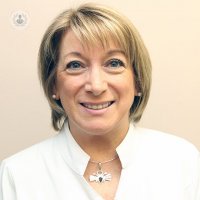Features a speech at a dental clinic
Written by:What does a speech therapist do in a dental clinic?
It's the first thing that patients ask themselves when they get here and the orthodontist drifts them to the speech therapist. In the mouth we develop a series of functions, not only speech but also the chewing of food, swallow ... When these functions are not performed properly because the tongue, which is the main organ that works for these functions, or the lips do not perform well its role, this greatly influences the dental occlusion and the growth and development of the teeth and that is why the orthodontist takes into account the muscular role and derives the speech therapist. At the moment when there is some type of muscular problem we are referred to the patient so that his orthodontic treatment comes to a good end.

When is your intervention necessary?
In our clinic the Dr. Mark is the first to do the initial assessment of the patient and when he observes some type of distortion, a breathing by mouth, a misplaced tongue, he asks me to see the patient. In that case what I do is evaluate the functions because if the patient breathes through the mouth normally that tongue will be badly placed and will create an incorrect push, will lead to the teeth to a malposition. In these situations swallowing may also be compromised, in other cases it is mastication that is altered, an inefficient mastication or a patient that tightens teeth also called bruxism, which is also very important to consider because it may cause disjunctions of the temporomandibular joint and pain, which is even more complicated to solve. Therefore the intervention of the speech therapist is always detect some type of dysfunction at the level of breathing, swallowing, chewing and even speech in relation to all these altered functions.
How can a dental device affect the patient's speech?
In principle it does not have to be a great affectation. Logically whenever there is something different in the mouth, the first few hours, the first days we need to adapt to the novelty, but in principle there should be no difficulty. Sometimes the placement of the brackets can, in the first hours or in the first days, give some difficulty to reproduce some phoneme, for example the sound of the T that requires that the tongue comes closer to the area where the brackets are. As for the removable appliances, to remove and put, which are usually used by children in temporary dentition, require a few days of adaptation and children adapt very quickly, there is no need to be afraid of it.
When should a treatment of this type be started?
A logopédico treatment of this type has to begin as soon as it is observed that there is some type of dysfunction, for example in small children that there is some harmful oral habit like the digital suction or in bigger children, even in adults, biting the nails, which is called onicofagia, which also requires a speech therapy treatment. The treatment is started as soon as the bad habit is detected, if a respiratory dysfunction, a swallowing problem, mastication, ATM have been detected ... the sooner the treatment is started. We always need the diagnosis of the dentist, maxillofacial if it is a patient that comes from an orthognathic surgery of the pediatric dentist in the case of a child, the orthodontist ..., in short, it is a team work. The sooner we start, the better. In the case of children, for the prevention of acting before they generate more problems, and in others, to reeducate and that the dental treatment that is carried out comes to a good end.



